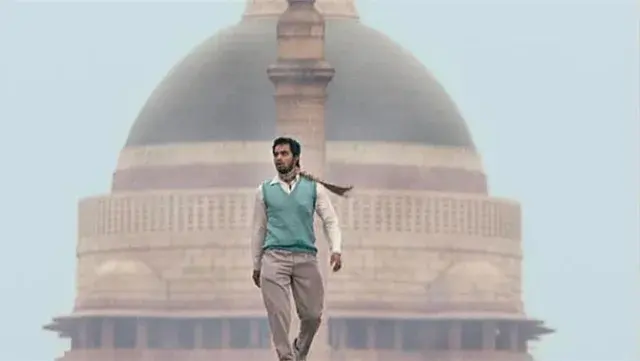Monkeys have resided in North Indian cities for ages. Treated as gods, and generously fed,
they lost the will to poach for food, instead entering human spaces to steal. These 'gods became
pests' as the film tells in its opening.
The idea is to not harm the monkeys or to displace them. It is merely to drive them away from the homes of MPs and other ministry buildings. Perhaps it is also about turning unemployed youth into langurs. The satire in the story is veiled under the story of its everyman characters. The film largely employs a non-actor cast. These characters find themselves in insignificant spaces, and their desperations and struggles are captured intimately.
We witness Anjani getting frustrated with his life, being degraded and humiliated by his peers. The character is one of a disillusioned youth that is run down by the system, clearly knowing they are worth more than the jobs they do. The side plot involving his brother-in-law at his job is poignant. The story of a man struggling with power he is not ready to wield supports the deep-seated arguments the film subtly offers. At times, the obstacles per se are not as much of a problem for the characters as the system and the bureaucracy.
The cinematography of Saumyananda Sahi has the attention to detail of a nature documentary, painstakingly capturing the monkeys in their natural habitat, while intimately following the whims of the protagonist Anjani, through his insecurities and in his theatrics. The script written by Shubham is tight, with dialogue so realistic that it seems to come from an impromptu dinner conversation in the narrow streets of Delhi's outskirts.
Director Prateek Vats has religiously worked with non-actors and actors alike to build meta narratives and improvisations. The nearly unfilmable film flows smoothly and keeps on giving, along with being wise and sincere. The filmmakers have found just enough to comment and at the same time tell an intimate story about frustration, loss of identity, will and finding one's place in the world.
Written by Nimish K Sharma
Everyone is aware of this nuisance, but few would have thought to make a political satire and a character study out of it. Prateek Vats sets his film in Lutyens' Delhi, around the most important centres of the capital, and focuses on a peculiar job that has sprung up - monkey repellers.
Previously, tamed langurs were used to repel monkeys, their natural enemy. With a ban on their use, the absurd solution was humans who could scream like langurs to fend off monkeys. The story follows a young migrant Anjani who joins the efforts to get rid of the monkeys, but is never quite able to get the intonation of 'Eeb Allay Ooo', the call of the langurs, right. He resorts to unique and downright ingenious schemes and plans to be good at his job, but is pulled down by the authorities.The idea is to not harm the monkeys or to displace them. It is merely to drive them away from the homes of MPs and other ministry buildings. Perhaps it is also about turning unemployed youth into langurs. The satire in the story is veiled under the story of its everyman characters. The film largely employs a non-actor cast. These characters find themselves in insignificant spaces, and their desperations and struggles are captured intimately.
We witness Anjani getting frustrated with his life, being degraded and humiliated by his peers. The character is one of a disillusioned youth that is run down by the system, clearly knowing they are worth more than the jobs they do. The side plot involving his brother-in-law at his job is poignant. The story of a man struggling with power he is not ready to wield supports the deep-seated arguments the film subtly offers. At times, the obstacles per se are not as much of a problem for the characters as the system and the bureaucracy.
It is an intensely real story with a script penned down immaculately to suit dialects and tones. The famous roads of Lutyens' become a space of fascination. It's not the monkeys, but the politicians and the bosses that become the source of comedy.
Mahinder (a non-actor who plays himself) argues that Lutyens belongs to the monkeys and not the politicians because they are never permanent residents. Their stay is dictated by the waves of political favour. Despite the issues the film tackles, it remains intimate and does not ever rise above its down-to-earth characters. The story is always about the regular man, and poignant commentary is found between the lines.The cinematography of Saumyananda Sahi has the attention to detail of a nature documentary, painstakingly capturing the monkeys in their natural habitat, while intimately following the whims of the protagonist Anjani, through his insecurities and in his theatrics. The script written by Shubham is tight, with dialogue so realistic that it seems to come from an impromptu dinner conversation in the narrow streets of Delhi's outskirts.
Director Prateek Vats has religiously worked with non-actors and actors alike to build meta narratives and improvisations. The nearly unfilmable film flows smoothly and keeps on giving, along with being wise and sincere. The filmmakers have found just enough to comment and at the same time tell an intimate story about frustration, loss of identity, will and finding one's place in the world.
Written by Nimish K Sharma








